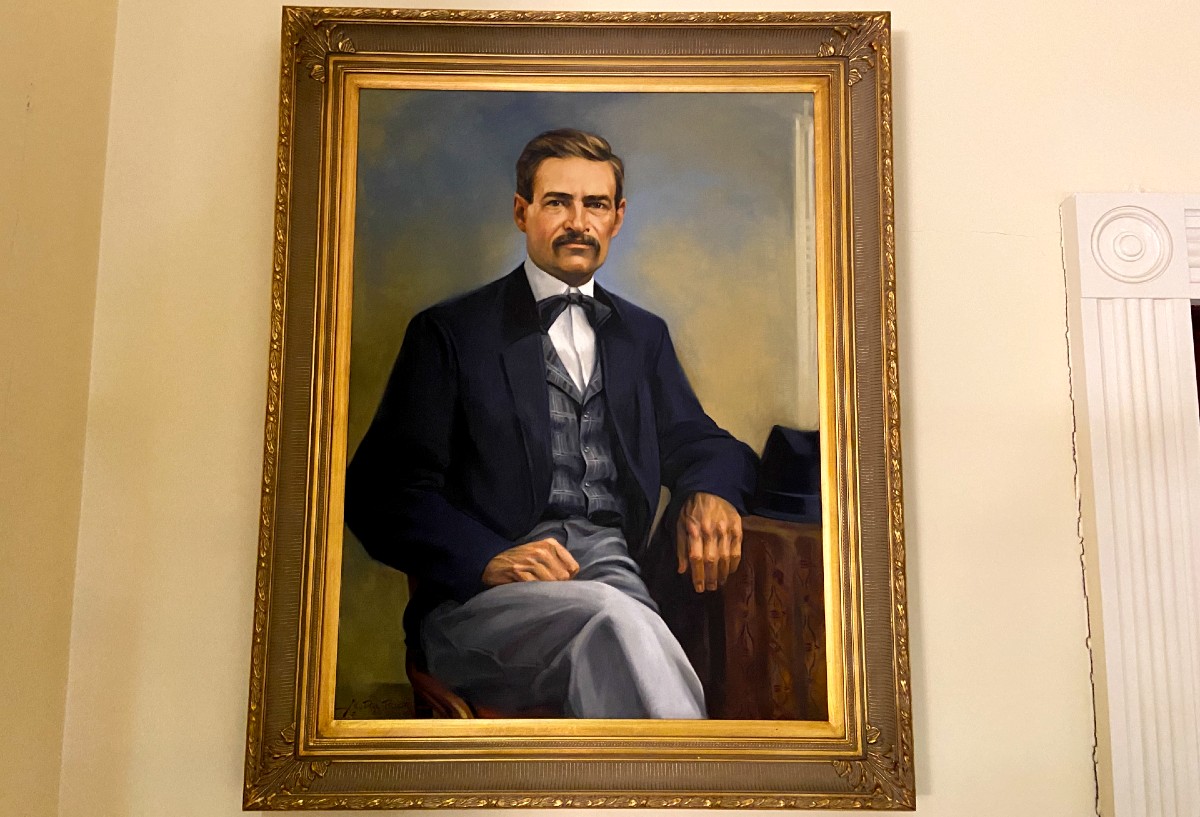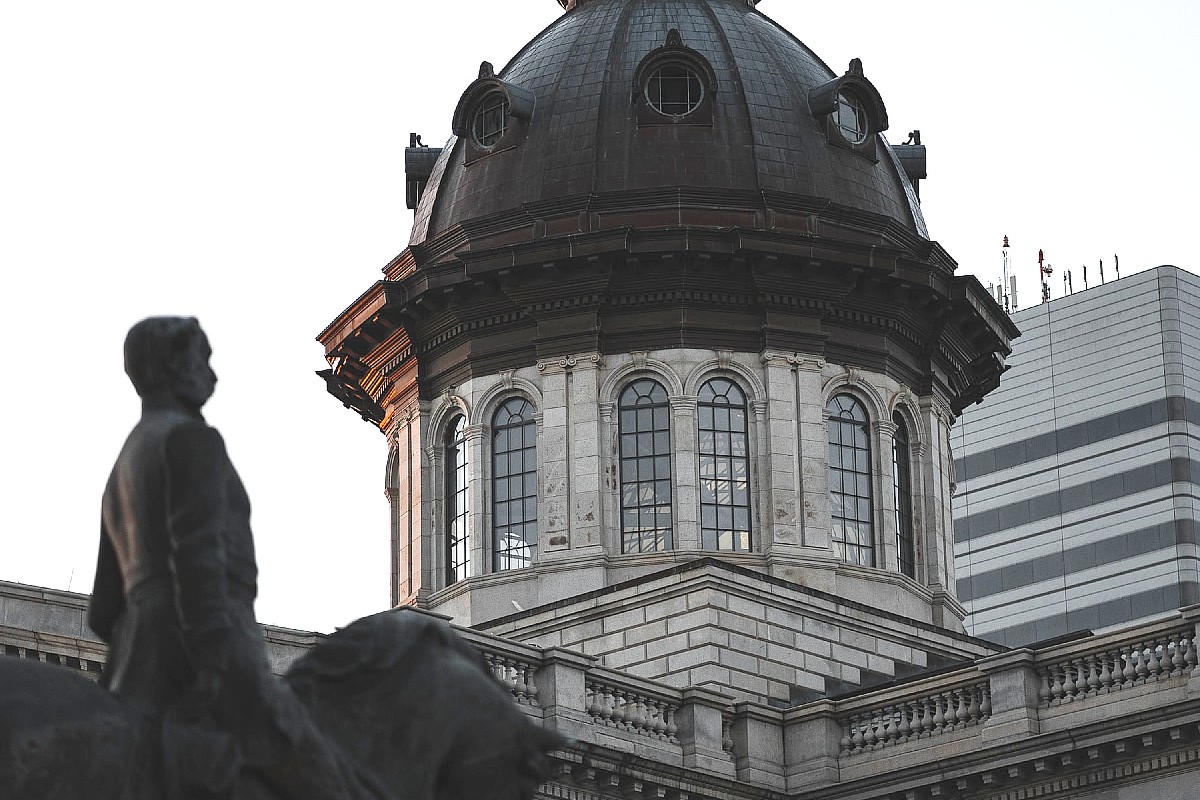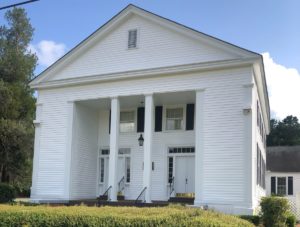STATEHOUSE REPORT | ISSUE 20.42 | OCT. 15, 2021
BIG STORY: State is vulnerable to climate change, but not priority for some lawmakers
NEWS BRIEFS: Portrait of Civil War hero now out of closet and on Senate wall
LOWCOUNTRY, Ariail: The leaves are falling and …
COMMENTARY, Brack: Vague school disciplinary law rightly blocked, but ruling appealed
SPOTLIGHT: The S.C. Education Association
MY TURN: Eight ways to take back your power
FEEDBACK: Some don’t want vaccine
MYSTERY PHOTO: What’s this painting all about?
State is vulnerable to climate change, but not priority for some

By Al Dozier, Statehouse correspondent | South Carolina is considered the fourth most vulnerable state to climate change’s effects, according to a recent report from the John Hopkins Bloomberg School of Public Health. The report also found that it is among the eight most unprepared states to deal with negative health effects associated with climate change.
But do South Carolina legislators care about climate change? They had mixed responses when contacted by Statehouse Report.
News about climate change has been around for the past 20 years, said House Minority Leader Todd Rutherford, D-Richland. But there’s a lot of uncertainty about what should be done about it. He said he has yet to hear a solution to the problem.
“I don’t know what we are supposed to do,” he said, noting the Republican leadership in the legislature is taking no action on the issue.
Rutherford said it’s time to hire a panel of experts to review the problem and make recommendations to the legislature for appropriate action. But some lawmakers are not expressing concerns.

Rep. David Hiott, a Pickens County Republican who serves as chairman of the House Agriculture, Natural Resources and Environmental Affairs Committee, said he has not seen the report. He declined comment when asked views on climate change issues.
But Sen. Tom Davis, R-Beaufort, acknowledged that it is an issue and that a remedy is under way. He believes actions will be taken in the near future. In an interview Davis said Gov. Henry McMaster has formed a task force, the S.C. Floodwater Commission, that is studying several issues, including climate change, and he expects recommendations to come forward.
Meanwhile, Rep. Spencer Wetmore, D-Charleston, a known advocate for climate change initiatives, told Statehouse Report that there are a lot of positive efforts underway, such as the move to electric cars and renewable energy initiatives.
“But there is a lot of work to do,” she said.
She said lawmakers have sponsored various bills to deal with the results of climate change, but most of those actions are related to “impact” rather than prevention.
While some consider the failure by lawmakers to take statewide action on climate change, and inaction by McMaster, who supported the Paris Climate Accords pullout by former President Donald Trump, Wetmore said it should not be a political issue.
“Climate change supersedes partisanship,” she said.
What’s happened recently
Initial action by the Floodwater Commission set up by McMaster called for several recommendations, including a call for channelizing rivers and digging new lakes to hold back flood water, while advocating for more development around the lakes. Some of those recommendations have been criticized by the Senior Conservation Leadership Alliance, an organization made up of scientists.

When asked by Statehouse Report about the governor’s stance on climate change, Communications Director Brian Symmes said the establishment of the Disaster Relief and Resilience Act backed by McMaster is now addressing climate change issues.
The act, passed by the legislature in September 2020, established the position of chief resilience officer and the S.C. Office of Resilience to coordinate disaster recovery and resilience efforts within the state, creates the Disaster Relief and Resilience Reserve Fund to finance disaster recovery efforts and hazard mitigation projects, and creates the Resilience Revolving Fund to provide low-interest loans to local governments to perform floodplain buyouts and restoration.
Effects of climate change
The effect of climate change in South Carolina has been studied exhaustively over the last three decades, according to the Coastal Conservation League. According to its website, the consequence of steady increases in greenhouse gas emissions like carbon dioxide by human activities has been documented. Today, 97 percent of climate scientists around the world agree that these emissions are resulting in an increase of average global temperatures. The southeastern region of the U.S ranks sixth worldwide in greenhouse gas emissions while South Carolina ranks 28th nationally.
Changing weather patterns also are expected to expose many sectors of the South Carolina economy to stresses that may significantly undermine the productivity of industries related to agriculture, forestry and fisheries.
Drought, invasive species, dieback of forests, fish and shellfish reductions, and tree species loss are but a sampling of the problems associated with a warming climate.
With 2,876 miles of coastline and a heavy dependence on coastal tourism based tax revenue, experts add that sea level rise poses a disproportionate threat to the natural resources and economy of the state, according to the league. In the future, the state is expected to face more flooding, more shoreline erosion, and further loss of coastal wetlands due to saltwater intrusion.
- Have a comment? Send to feedback@statehousereport.com
Portrait of Civil War hero now out of closet and on Senate wall

By Herb Frazier, Charleston City Paper | A portrait of a Black Reconstruction-era state senator and Civil War hero sat in a Statehouse closet for 13 years before finally being put on display Thursday in the Senate chamber without a public ceremony.

From the blood-soaked sands of Morris Island during the Union Army’s assault on Fort Wagner near Charleston, Stephen Atkins Swails became the first black U.S. Army officer. Following the war, Swails gained prominence as a Williamsburg County businessman, newspaper editor and the first black man to serve as the Senate’s president pro tempore. He served in the state Senate from 1868 to 1878.
S.C. Sen. Gerald Malloy, D-Darlington, this week told the Charleston City Paper that the portrait was hung in a private ceremony after the newspaper questioned where it was. Malloy said he spoke to Senate President Harvey S. Peeler, R-Cherokee, who he said “is a friend, and he is conscious of these issues.” He declined to detail his conversation with Peeler.
Meanwhile Thursday, the specter of race raised its head when S.C. Sen. Sandy Senn, R-Charleston, took the opportunity to comment on Swails’ fair complexion. In an email with a “what’s up” emoji that she sent to Senate Clerk Jeffrey Gossett and all of the state’s senators, she wrote: “That sure is the whitest looking black guy I’ve ever seen.”
Meanwhile Thursday, the specter of race raised its head when S.C. Sen. Sandy Senn, R-Charleston, commented on Swails’ fair complexion. In an email with a “what’s up” emoji that she sent to Senate Clerk Jeffrey Gossett and all of the state’s senators, she wrote: “That sure is the whitest-looking black guy I’ve ever seen.”
In an interview today, Senn said she didn’t mean the comment as a slight to Swails, but she thought she was sent a picture of the wrong portrait.
“I think this whole thing got blown way out of proportion,” she said. “I didn’t ever, ever intend for any kind of slight to this man. I think some good is going to come out of this. More attention is going to be brought to his significant and extraordinary history. Nothing I said is derogatory toward him. The good news is even if it is going to be at my expense, this gentleman will get some overdue recognition.”
In an interview with the City Paper, Malloy said: “I have no words to respond to comments like that.”
- Read the full story in our sister publication, the Charleston City Paper.
In other recent news:
![]() Black history board members dismissed. Two veteran members of a state commission that promotes the preservation of Black history and culture said they were unexpectedly and unceremoniously “removed” from positions held since 1993, when state lawmakers created the S.C. African American Heritage Commission. A state official said there were more applicants this year than open seats. More: Charleston City Paper.
Black history board members dismissed. Two veteran members of a state commission that promotes the preservation of Black history and culture said they were unexpectedly and unceremoniously “removed” from positions held since 1993, when state lawmakers created the S.C. African American Heritage Commission. A state official said there were more applicants this year than open seats. More: Charleston City Paper.
Civil rights groups sue McMaster, state lawmakers over redistricting. Two civil rights groups are suing South Carolina, saying state lawmakers are taking too long to draw new district maps. More: Associated Press, WCSC TV, The State, The Post and Courier.
S.C.’s abortion restrictions to go to U.S. appellate court. The 4th U.S. Circuit Court of Appeals has tentatively scheduled oral arguments for Dec. 6 in a lawsuit challenging South Carolina’s new abortion law, which took effect this year and bans abortions after fetal cardiac activity is detected. Cardiac activity typically occurs six weeks into pregnancy. Since pregnancy is calculated from a person’s first day of her last period — not ovulation date — this means that many women may not know they are pregnant. More: AP News.
Biden wants wind farms along coasts, including S.C.’s. Under a plan announced by the Biden administration Wednesday, seven major offshore wind farms would be developed along the U.S. coasts, including in the Carolinas, an area between North Carolina and South Carolina called Carolina Long Bay. The lease sales will be held by 2025, under the plan, which seeks 30 gigawatts of power by 2030. That would power more than 10 million homes. More: AP News | The New York Times.
Haley tapped for lifetime seat on Clemson board. Former S.C. Gov. and United Nations Ambassador Nikki Haley, who now lives at Kiawah Island, has been appointed to fill a lifetime seat on the Clemson University Board of Trustees vacated by former House Speaker David Wilkins of Greenville. Wilkins also served as ambassador to Canada in the Bush administration in the early 2000s. More: SC Public Radio, The Post and Courier.
S.C.’s Arrington sues Pentagon, NSA amid probe over disclosing classified info. Katie Arrington, a former Lowcountry congressional candidate and GOP state lawmaker who went on to work for the Pentagon, is suing the Department of Defense and the National Security Agency, citing what she says are the agencies’ delays in investigating allegations she disclosed classified information.
2022: Scott rakes in $8.3M for reelection. South Carolina’s U.S. Sen. Tim Scott has become one of the Republican Party’s most prolific fundraisers. He is heavily favored to win his 2022 reelection bid, leaving some to speculate a possible 2024 presidential bid. More: Politico.
Former SCANA CEO heads to prison soon. Former SCANA CEO Kevin Marsh is the first executive tied to a bungled billion-dollar nuclear project in South Carolina to go to jail. Construction on the V.C. Summer expansion project lasted nine years and consumed $10 billion — and it was canceled before it could be completed and produce any electricity. More: AP News, The Post and Courier, The State.
- Want more headlines every business day that are like this? Visit our friends at SC Clips.
The leaves are falling and …

Cartoonist Robert Ariail always has an interesting take on what’s going on in South Carolina. His weekly “Lowcountry” strip is originally drawn for our sister publication, the Charleston City Paper. Love the cartoon? Hate it? What do you think: feedback@statehousereport.com. Check out the Best of Charleston 2021.
Vague school disciplinary law blocked, but ruling appealed

By Andy Brack, editor and publisher | A school-to-prison pipeline emboldened by what’s been called a vague disorderly conduct law is closed for now, but the state attorney general wants it back. Instead of appealing a law that has wrongly criminalized student behavior for too long, S.C. Attorney General Alan Wilson should let schools follow normal disciplinary protocols to do their jobs and stop wasting time in federal courts.
 In a 39-page ruling, Senior U.S. District Judge Margaret B. Seymour of Columbia on Oct. 8 issued an order to keep the state permanently from enforcing a law that allowed students to be charged criminally for what the ACLU of South Carolina says can be normal adolescent behaviors “including cursing or undefined ‘disorder’ or ‘boisterousness’ behavior at school.” The judge also ruled the state couldn’t keep records of students charged under the law or an earlier version of it that was on the books for years.
In a 39-page ruling, Senior U.S. District Judge Margaret B. Seymour of Columbia on Oct. 8 issued an order to keep the state permanently from enforcing a law that allowed students to be charged criminally for what the ACLU of South Carolina says can be normal adolescent behaviors “including cursing or undefined ‘disorder’ or ‘boisterousness’ behavior at school.” The judge also ruled the state couldn’t keep records of students charged under the law or an earlier version of it that was on the books for years.
“The court recognized that broadly criminalizing students as a means to manage their behavior is not only bad policy, [but] it also violates their constitutional rights,” said Sarah Hinger, a senior staff attorney with the ACLU Racial Justice Program in a press statement. “The court has sent a clear message: Rather than funnel children into the school-to-prison pipeline over minor rule-breaking and protected First amendment activities, schools must recognize and protect students’ rights.” Another lawyer for the organization said it would continue fighting against “draconian school policing models” and push for evidence-based efforts to keep schools safe.
Between 2015 and 2020, more than 5,000 South Carolina students were arrested for disorderly conduct. More than 70 percent of those arrests occurred at schools — and disproportionately among students of color and students with disabilities, the ACLU said.
“Black students across the state were more than six times as likely as white classmates to be targeted under the law and arrested for being ‘disorderly’ or ‘boisterous,’” the group said, adding that disabled students were also often charged instead of getting the support services they needed.
The case, originally filed in 2016, included a Columbia student who was arrested and taken to a detention center for crying out after a school resource officer picked up and threw a classmate to the ground. Other plaintiffs in Conway, Summerville and Travelers Rest later were added to the case.
Wilson’s office, which appealed the ruling to the Fourth Circuit Court of Appeals on Oct. 12, said it had no comment because the litigation was pending. But it argued to Seymour that nullifying the law would take away law enforcement tools at schools and “leave matters up to school disciplinary policy.”
Seymour disagreed. She ruled the law, which was passed by the legislature in 2018 to supersede another law on the books for generations, abridged fundamental rights held by students.
“These tools furthermore encourage, if not cause, arbitrary and discriminatory enforcement, as reflected by the undisputed record, because they provide law enforcement with no standard for application,” she wrote. “The record further demonstrates that the charge itself, even absent a conviction, carries long-lasting and deleterious effects.
“The state is capable of fashioning its law enforcement tools to address specifically for the school context what conduct it would criminalize and the standard by which the prohibition should be applied, and our Constitution requires no less.”
In other words, the state can’t just roust students for what may be considered regular student behavior to get troublemakers out of the way. There has to be a clear process to dispense discipline in schools.
South Carolinians should expect no less. Schools need to be safe, but schools also need to follow the freedoms protected in the Constitution. Let’s keep schools places of learning, not places where craven politicians try to score political points by filling schools with police as a way to throw red meat to their base.
- Have a comment? Send to: feedback@statehousereport.com.
The S.C. Education Association
 The public spiritedness of our underwriters allows us to bring Statehouse Report to you at no cost. This week’s spotlighted underwriter is The South Carolina Education Association(The SCEA), the professional association for educators in South Carolina. Educators from pre-K to 12th grade comprise The SCEA. The SCEA is the leading advocate for educational change in South Carolina. Educators in South Carolina look to The SCEA for assistance in every aspect of their professional life. From career planning as a student to retirement assessment as a career teacher, The SCEA offers assistance, guidance, and inspiration for educators.
The public spiritedness of our underwriters allows us to bring Statehouse Report to you at no cost. This week’s spotlighted underwriter is The South Carolina Education Association(The SCEA), the professional association for educators in South Carolina. Educators from pre-K to 12th grade comprise The SCEA. The SCEA is the leading advocate for educational change in South Carolina. Educators in South Carolina look to The SCEA for assistance in every aspect of their professional life. From career planning as a student to retirement assessment as a career teacher, The SCEA offers assistance, guidance, and inspiration for educators.
- Learn more: TheSCEA.org
Eight ways to take back your power

By Bryce Fiedler and Kelly Brady, republished with permission | South Carolina has some of the most powerful politicians in the country. They exercise unwarranted powers over state government and the economy and face very little accountability for their decisions, creating a breeding ground for corruption. How can South Carolinians take their power back?
1. Restore judicial independence
The public deserves confidence that judges rule independently of the state Legislature. South Carolina is just one of two states where their legislatures primarily control the election of judges, including those on the S.C. Supreme Court. The selection of county magistrates, meanwhile, is often controlled by just one or two state senators.
 To eliminate lawmakers’ stranglehold over the judiciary, the governor should nominate judges with Senate confirmation, as is done at the federal level. Not only would this method reduce the legislative influence crippling our judicial integrity, but also would avoid the inevitable partisan politics that come with popularly electing judges. While this reform would require amending the state Constitution for most state judgeships, fixing the selection process for magistrates would only need a change of state law.
To eliminate lawmakers’ stranglehold over the judiciary, the governor should nominate judges with Senate confirmation, as is done at the federal level. Not only would this method reduce the legislative influence crippling our judicial integrity, but also would avoid the inevitable partisan politics that come with popularly electing judges. While this reform would require amending the state Constitution for most state judgeships, fixing the selection process for magistrates would only need a change of state law.
2. Strip lawmakers of their executive powers
South Carolina lawmakers control state and local affairs through a complicated web of boards and commissions that have executive powers, making it difficult for citizens to know who to hold responsible for important public decisions. As the state’s chief executive, the governor should control appointments to state boards/commissions – or better yet, eliminate or consolidate those panels when possible.
There also are too many statewide constitutional officers such as the Comptroller General, Treasurer, Agriculture Commissioner and Secretary of State. The number of constitutional officers should be reduced and made part of the governor’s cabinet, centralizing accountability under a single executive officer.
Similarly, local matters should be decided by local officials. That means every regional board and committee currently under legislative control should be appointed by local governments.
3. Shorten legislative sessions
Our state has one of the longest legislative sessions in the Southeast – a model that promotes government growth and excessive regulation. Lawmakers should only be in Columbia as long as it takes to pass the state budget and address the most urgent taxpayer issues.
Regular legislative sessions generally should be limited to 90 calendar days or 45 legislative days, a period much closer to the average session length of our neighbors. Not only would this keep lawmakers focused on their basic responsibilities, but also would limit the time they spend each year filing hundreds of frivolous resolutions. In fact, these resolutions should be banned outright, as they function as little more than campaign tools for lawmakers by way of rewarding handpicked constituents and allies.
More recently, lawmakers have made it a habit to return to Columbia on multiple occasions after the regular session has ended. While finalizing the budget is often the stated reason, their end-of-session rules permit them to consider a slew of non-essential legislative issues. This practice must end. If lawmakers must reconvene for a special session, it should be reserved for the budget or true emergencies.
4. End lawmakers ability to police themselves
Unlike other officeholders, state House and Senate members police their own ethics violations, and much of the process is secret. The standing legislative ethics committees should be abolished, and all complaints be handled by the State Ethics Commission, which should immediately forward all criminal complaints to the S.C. Attorney General’s Office and punish lawmakers for other substantiated violations, including issuing fines.
It’s also worth debunking lawmakers’ claim that the S.C. Constitution requires them to judge and punish their own members for ethical infractions. The constitution states that “each house shall … punish its members for disorderly behavior, and, with the concurrence of two-thirds, expel a member, but not a second time for the same cause.”
This section clearly refers to lawmakers’ behavior during their legislative proceedings, such as floor activity at the State House or during committee meetings. The idea that legislators should police each other’s ethical violations does not hold up to legal scrutiny.
5. Force officials to report all public income
The public has no way to ensure that elected state and local officials don’t personally profit from legislation they sponsor or vote on when they legally can hide certain income sources on their annual statements of economic interests. State law was changed several years ago to require public officials to report their private income sources – a reform we pushed for – but it didn’t go far enough.
Currently, officials generally are required to disclose income they earn directly from government. That’s a good start, but they also make money from government in other ways, such as subcontracting with businesses that receive tax dollars.
All public income earned by officials, either directly or indirectly, should be reported on their annual statements of economic interests.
6. Post all important public records online
South Carolina’s freedom-of-information model is a costly and inefficient way for citizens to obtain important information. State law puts few helpful parameters on what agencies may charge, and many will wait until the statutory deadline to acknowledge whether such records exist. These records belong to the public, not the agencies that produce them.
Going forward, every state and local agency should post all public documents online in an easily identifiable location, making open-records requests and the fees that accompany them largely unnecessary. A similar effort should be made for past agency records. Only in the most extreme cases that require significant labor should agencies charge for requests.
Also, the statutory exemption that shields lawmakers and their staffs from such requests should be eliminated immediately.
7. Open the state’s secret incentives process
Corruption is virtually guaranteed when public officials have the power to strike secret deals with private companies using public money – which can total hundreds of millions of dollars for just one project. If officials insist on using incentives, taxpayers deserve full transparency on every deal made – including applications for subsidies, disclosure of all incentives awarded, and an annual reporting of required investment and job figures. If companies fail to keep their original promises, taxpayers should be refunded the full amount of all paid incentives.
Ultimately, the state’s reliance on incentives to attract business would not be necessary if our tax structure were simplified and applied more evenly. Ending the long list of sales tax exemptions, for example, would allow us to cut taxes elsewhere to benefit businesses and residents alike.
8. Enforce complete reporting of state budget requests
When state agencies submit their annual budget requests to the Governor’s Office, the law requires them to justify the entire amount of money they are requesting. Each year, they ignore this rule and only provide an explanation when asking for new funds.
This lack of scrutiny keeps us from asking a simple question necessary for every government program: Do we really need this? These discussions are crucial in the face of South Carolina’s looming $50 billion pension deficit, and current positive economic conditions cannot last forever. The governor must enforce the budget law and require agencies to justify every dollar they request.
This commentary by S.C. Policy Council analysts Bryce Fiedler and Kelly Brady first appeared on the council’s website. Have a comment? Send to: feedback@statehousereport.com.
Some don’t want vaccine
![]() To the editor:
To the editor:
We the people don’t want their poison. Just wait until people start dropping like flies from the consequences of the damnable vaccine. You would have to be brain dead to think three drug companies made a vaccine in a matter of months that has any positive effects. I am keeping the community [and] I’m boosting my immune system and if God decides I should go via COVID, that’s what it will be.
— Bonnie Grancelli, Greenwood, S.C.
EDITOR’S NOTE: Health professionals throughout the state, including Dr. Robert Saul of Greenwood, emphasize the safety and effectiveness of the vaccine. We encourage you to ignore anti-vaccine rhetoric and to get the vaccination, as we wrote in the original column. to do otherwise is irresponsible.
Send us your thoughts
We receive a few comments a week and look forward to publishing. But often we can’t because we can’t verify the identity of the writer. To be published, you’ve got to provide us with contact information so we can verify your letters. Verified letters to the editor are published weekly. We reserve the right to edit for length and clarity. Comments are limited to 250 words or less. Please include your name and contact information.
- Send your letters or comments to: feedback@statehousereport.com
What’s this painting all about?

Here’s a painting that has relevance to South Carolina. What can you tell us about it? Send your guess to feedback@statehousereport.com — and remember to include your name, home city and contact information.
 Last week’s mystery, “Another mystery church,” is of Hopewell Presbyterian Church in rural Florence County. Thanks to Barry Wingard of Florence for sending the photo, which was identified by Will Bradley of Las Vegas, Nevada; Elizabeth Jones of Columbia; George Graf of Palmyra, Va.; David Lupo of Mount Pleasant; Penny Forrester of Tallahassee, Fla.; Allan Peel of San Antonio, Texas; Bill Segars of Hartsville; Kevin Mertens of Greenville; and Jacie Godfrey of Florence .
Last week’s mystery, “Another mystery church,” is of Hopewell Presbyterian Church in rural Florence County. Thanks to Barry Wingard of Florence for sending the photo, which was identified by Will Bradley of Las Vegas, Nevada; Elizabeth Jones of Columbia; George Graf of Palmyra, Va.; David Lupo of Mount Pleasant; Penny Forrester of Tallahassee, Fla.; Allan Peel of San Antonio, Texas; Bill Segars of Hartsville; Kevin Mertens of Greenville; and Jacie Godfrey of Florence .
Jones told us the church was founded in 1770 and is the oldest in Florence County.
Graf added, “Hopewell Presbyterian Church and Hopewell Cemetery are historically related properties set at opposite sides of Old River Road in the Claussen community of rural Florence County. The church, completed in 1842, is a good example of a two-story frame edifice in the Greek Revival style. The church has a pedimented front gable end, two-story portico with two wood pillars and matching pilasters at the enclosed outer bays, and bands of five windows, taller at the principal level, at the side elevations. The building is clad in weatherboard, except the tympanum and wide architrave have flushboard siding, and rests on a brick pier foundation with brick infill. The cemetery, in use since the late eighteenth century, occupies a three-acre site where the original Hopewell Presbyterian Church stood. It contains a notable collection of nineteenth century marble headstones and monuments, many signed by their carvers, laid out in a distinctive pattern of alignment by family. Inside the cemetery is the church’s early Session House. Listed in the National Register June 2, 2000.”
- Send us a mystery. If you have a photo that you believe will stump readers, send it along (but make sure to tell us what it is because it may stump us too!) Send to: feedback@statehousereport.com and mark it as a photo submission. Thanks.
ORDER NOW: Copies are in Lowcountry-area bookstores now, but if you can’t swing by, you can order a copy online today.
ABOUT STATEHOUSE REPORT
Statehouse Report, founded in 2001 as a weekly legislative forecast that informs readers about what is going to happen in South Carolina politics and policy, is provided to you at no charge every Friday.
- Editor and publisher: Andy Brack, 843.670.3996
Donate today
We’re proud to offer Statehouse Report for free. For more than a dozen years, we’ve been the go-to place for insightful independent policy and political news and views in the Palmetto State. And we love it as much as you do.
But now, we can use your help. If you’ve been thinking of contributing to Statehouse Report over the years, now would be a great time to contribute as we deal with the crisis. In advance, thank you.
Buy the book
Now you can get a copy of editor and publisher Andy Brack’s We Can Do Better, South Carolina! ($14.99) as a paperback or as a Kindle book ($7.99). . The book of essays offers incisive commentaries by editor and publisher Andy Brack on the American South, the common good, vexing problems for the Palmetto State and interesting South Carolina leaders.
More
- Mailing address: Send inquiries by mail to: P.O. Box 21942, Charleston, SC 29413
- Subscriptions are free: Click to subscribe.
- We hope you’ll keep receiving the great news and information from Statehouse Report, but if you need to unsubscribe, go to the bottom of the weekly email issue and follow the instructions.
- Read our sister publications: Charleston City Paper (every Wednesday) | Charleston Currents (every Monday).
- © 2021, Statehouse Report, a publication of City Paper Publishing, LLC. All rights reserved.

















 We Can Do Better, South Carolina!
We Can Do Better, South Carolina!